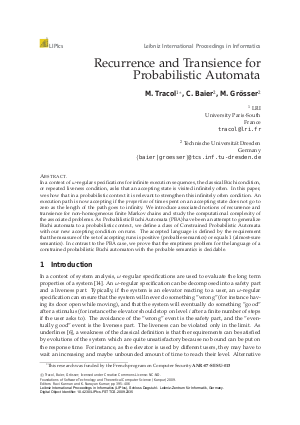Recurrence and Transience for Probabilistic Automata
Authors Mathieu Tracol, Christel Baier, Marcus Grösser
-
Part of:
Volume:
IARCS Annual Conference on Foundations of Software Technology and Theoretical Computer Science (FSTTCS 2009)
Part of: Series: Leibniz International Proceedings in Informatics (LIPIcs)
Part of: Conference: IARCS Annual Conference on Foundations of Software Technology and Theoretical Computer Science (FSTTCS) - License:
 Creative Commons Attribution-NonCommercial-NoDerivs 3.0 Unported license
Creative Commons Attribution-NonCommercial-NoDerivs 3.0 Unported license
- Publication Date: 2009-12-14
File

PDF
LIPIcs.FSTTCS.2009.2335.pdf
- Filesize: 352 kB
- 12 pages
Document Identifiers
Subject Classification
Keywords
- Markov Chains
- Probabilistic Automata
- Buchi Automata
- Recurrence
- Omega-Regular Properties
Metrics
- Access Statistics
-
Total Accesses (updated on a weekly basis)
0PDF Downloads0Metadata Views
Abstract
In a context of $\omega$-regular specifications for infinite execution
sequences, the classical B\"uchi condition, or repeated liveness
condition, asks that an accepting state is visited infinitely often. In
this paper, we show that in a probabilistic context it is relevant to
strengthen this infinitely often condition. An execution path is now
accepting if the \emph{proportion} of time spent on an accepting state
does not go to zero as the length of the path goes to infinity. We
introduce associated notions of recurrence and transience for
non-homogeneous finite Markov chains and study the computational
complexity of the associated problems. As Probabilistic B\"uchi Automata
(PBA) have been an attempt to generalize B\"uchi automata to a
probabilistic context, we define a class of Constrained Probabilistic
Automata with our new accepting condition on runs. The accepted language
is defined by the requirement that the measure of the set of accepting
runs is positive (probable semantics) or equals 1 (almost-sure
semantics). In contrast to the PBA case, we prove that
the emptiness problem for the language of a constrained probabilistic
B\"uchi automaton with the probable semantics is decidable.
Cite As Get BibTex
Mathieu Tracol, Christel Baier, and Marcus Grösser. Recurrence and Transience for Probabilistic Automata. In IARCS Annual Conference on Foundations of Software Technology and Theoretical Computer Science. Leibniz International Proceedings in Informatics (LIPIcs), Volume 4, pp. 395-406, Schloss Dagstuhl – Leibniz-Zentrum für Informatik (2009)
https://doi.org/10.4230/LIPIcs.FSTTCS.2009.2335
BibTex
@InProceedings{tracol_et_al:LIPIcs.FSTTCS.2009.2335,
author = {Tracol, Mathieu and Baier, Christel and Gr\"{o}sser, Marcus},
title = {{Recurrence and Transience for Probabilistic Automata}},
booktitle = {IARCS Annual Conference on Foundations of Software Technology and Theoretical Computer Science},
pages = {395--406},
series = {Leibniz International Proceedings in Informatics (LIPIcs)},
ISBN = {978-3-939897-13-2},
ISSN = {1868-8969},
year = {2009},
volume = {4},
editor = {Kannan, Ravi and Narayan Kumar, K.},
publisher = {Schloss Dagstuhl -- Leibniz-Zentrum f{\"u}r Informatik},
address = {Dagstuhl, Germany},
URL = {https://drops.dagstuhl.de/entities/document/10.4230/LIPIcs.FSTTCS.2009.2335},
URN = {urn:nbn:de:0030-drops-23357},
doi = {10.4230/LIPIcs.FSTTCS.2009.2335},
annote = {Keywords: Markov Chains, Probabilistic Automata, Buchi Automata, Recurrence, Omega-Regular Properties}
}
